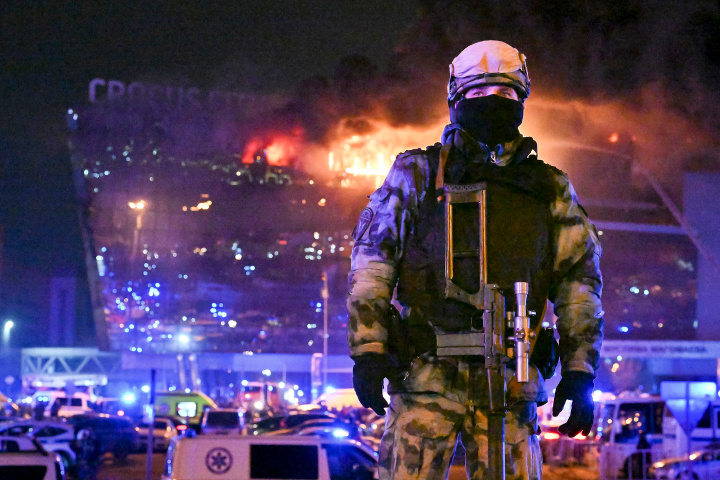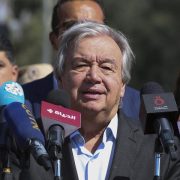
AP Photo/Dmitry Serebryakov
The March 22 attack on a packed concert hall in Moscow is a blow to Russian President Vladimir Putin with uncertain consequences for the country and the future of the war in Ukraine.
The attack was reportedly conducted by five men in camouflage who gunned down hundreds of people and set the building on fire. Over 60 people are dead, and hundreds are wounded. As we write, the attackers are still at large.
ISIS-K, a radical Islamic organization based in Afghanistan, claimed responsibility for the attack. Russia fought ISIS in Syria while supporting the Assad rule in Damascus.
As news broke, senior Russian officials, such as former President Dmitry Medvedev, claimed that Ukraine was behind it. Kyiv immediately denied any involvement.
In the past two weeks, the US had issued a warning about a possible terrorist attack in crowded places in major Russian cities. In the capital’s tense atmosphere rife with anti-American sentiment, some Russians see the warning as evidence of the US involvement in the attack.
It is unclear whether this will be an isolated incident or if more terrorist attacks are to be expected in the coming days. Increased security has been enforced in public places and transportation, imposing a heavy toll on the urban population.
Perhaps it is not essential who carried out the attack. The incident is a significant setback for Putin, coming shortly after elections that were widely believed to have been wholly rigged.
The attack revealed Russia’s vulnerability to terrorist attacks and underscored the need for systematic increased security in its cities. This new focus on internal security may impact war preparations in Ukraine as it may draw resources and attention from the frontline.
Moscow is amassing over 100,000 troops for a summer offensive to break through the Ukrainian defenses. Military-industrial production has increased over the past two years, and Moscow appears more prepared for a prolonged war of attrition.
It is uncertain whether the attack will be a minor distraction in the conflict or if terrorist threats will become a significant issue on the Russian home front.
The security failure is a sign of war fatigue in Russia.
In June of last year, Yevgeny Prigozhin, the leader of the Wagner mercenary group, rebelled and sent troops to march on Moscow in protest against Putin’s conduct in the war. In the initial year of fighting, Prigozhin’s frequent disputes with the generals over strategy helped keep the army on alert. It is unclear whether muzzling these disputes was beneficial to the war effort.
Despite having a greater supply of equipment and reinforcements, the Russian army has struggled to achieve significant results against Ukraine, leading to a prolonged and grinding war of attrition.
So far, major Russian cities have been largely shielded from the war’s spillover. Soldiers have mainly been recruited in rural areas and not urban areas. Greater security concerns and more threats in Moscow or Petersburg might change all of that.
In two years, it is the third major failure of Russian intelligence. The first was at the beginning of the war when Putin believed he could win in a couple of weeks. The second was last year when he failed to see and prevent Prigozhin’s revolt. This is even more significant because the US warned him about it. Putin is an intelligence man, and these failures cast a shadow on his core abilities.
China, an essential player in Russia’s re-industrializing effort, could get cold feet about increased Moscow’s vulnerabilities. China has reportedly increased its machine tool exports to Russia ten-fold in the past two years. The attack and its fallout may lead to a rethink in Beijing.






The purpose of the ‘special military operation’ is to break the power of US over Ukraine, which is the result of – as Victoria Nuland said in 2013 – spending $5b on developing democracy in Ukraine, in other words on interfering in Ukrainian politics – which led in 2014 to a violent coup that removed the elected president. At the time Russia was not military powerful enough to interfere. It did have the advantage that the Ukrainian military was largely stationed in the area it was recruited. According to the Swiss colonel Baud – who as the only Swiss officer served in NATO 2012 to 2917 – when the purged parliament in Kiev declared that only the Ukrainian language was the official language in the country, contrary to the Constitution, a very large part of the Ukrainian military in Crimea became ‘polite green men’ by removing the distinguishing elements from their uniform and so preventing interference by Kiev in the decision of the parliament of the the autonomous republic of Crimea to secede from Ukraine and to protect the referendum that voted in large majority for accession to the Russian Federation. Similarly according to the same colonel the Ukrainian forces in Donbass supported the resistance to the coup regime.
Russia has maintained that NATO membership of Ukraine and Georgia would be unacceptable. The Minsk agreements which would have ensured the neutrality of Ukraine were not implemented and US went on to prepare for Ukrainian NATO membership. For that it is necessary that Ukraine doesn’t have claims on land occupied by other countries, i.e. Ukraine’s NATO trained armed forces would attack and occupy Donbass and Crimea.
According to Russia it started its ‘special military operation’ about a week before that Ukrainian operation. After a month Ukraine and Russia reached a preliminary agreement in Istanbul which would reestablish Ukrainian neutrality but UK PM Boris Johnson came to Kiev and convinced the Ukrainian regime that US and NATO support would be enough to defeat Russia. Since which Russia executed plans that no doubt already largely existed to increase arms production and the size of its armed forces. According to the retired Polish general Rajmund Andrzejczak Ukrainian casualties should be counted “in the millions” ( https://menafn.com/1108000170/Retired-Polish-general-speaks-about-Ukraines-losses ) and the war is now nearing its end.
By keeping the fighting at the eastern end of Ukraine Russia kept its own casualties and costs much lower than those of Ukraine and its sponsors. Presumably Russia will now go on to take Charkow and Odessa and areas in between unless Ukraine Flies the White Flag and agrees to negotiations as suggested by the Pope.
The terrorist action of Ukraine into Russia did not have a significant influence except that it convinced even more Russians to support its government. According to Levada Center, a public opinion research organization in Moscow supported by Non Governmental Organizations financed by US Congress the popularity of president Putin is in the mid 80’s percentage which accords well with the election results.
1) the little green men and the separatist forces in Crimea and Donbasswere russian operatives, and in some cases the same people (es. Girin) operated in both fronts. In Donbass Russia in 2015 bombed ukrainian military positions from his own territory
2) 328/450 depties of the krainian Rda voted for the removal of Yanukoso, a great majority
3) the Minsk agrrement did not talk about the neutrality of Ukraine, but only about the peace in Donbass, and were not applied for disagreements about the parties
1. My information about the green men came from the the Swiss retired colonel Jacques Baud, who served in NATO at the time, also in Ukraine. Of course when they removed the distinctive markings from their uniform they changes their allegiance to the newly independent Crimean republic – and later to the Russian Federation.
I understood that in August 2015 while trying to close the border between Donbass and Russia a Ukrainian army unit was fired upon by Russian artillery, both tube and rocket, and was destroyed in two minutes.
2. The Rada vote was taken after the coup had taken place.
3. While for Russia the security of its main naval base in the Black Sea was of the higher importance, it paid Ukraine $500 million per year for its use, for ordinary people the suppression of their mother tongue was much more important and that was one of the main points in the program of the coup regime. At the time I wondered if a Russian agent in the regime had helped make this point so prominent. An important reason the Hungarian prime minister is opposed to the regime is its suppression of the use of the Hungarian language. As you probably know the regime wants Ukraine to become a member of EU which has a rule that people should be able to communicate with the authorities in their own language. One of the causes for the introduction of this rule was the case of a Frisian speaking car driver who was prosecuted in the Dutch language. He went to a higher court to void the verdict and won that case.
Not executing the Minsk II agreement and continuing to fire artillery at the civilians living in the Donbass might have allowed Russia to claim a ‘Responsibility to Protect’ but that is part of the US claimed “International Liberal Rules Based Order” under which US, and only US, has the authority to determine which rule is to be applied against which country. This authority in the eyes of US has primacy over the Charter of the United Nations. US used it to occupy Afghanistan and Iraq and to destroy Libya. One result of this war should be an end to that ‘Rules Based Disorder’.